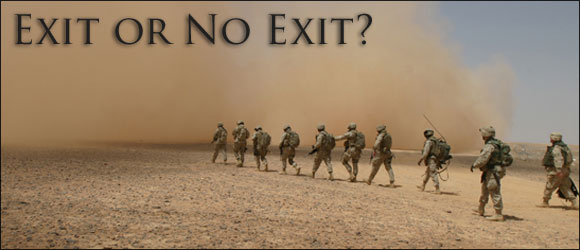Exit or No Exit? Morality and Withdrawal
Exit or No Exit? Morality and Withdrawal
Exit or No Exit?

There has been considerable–and heated–argument over the potential exit strategies from Iraq. Last month, Dissent co-editor Michael Walzer, Jean Bethke Elshtain, Sohail Hashmi, and Gerard Powers. debated the moral and political consequences of withdrawal from Iraq at Fordham University. The panel, which was sponsored by Fordham Center on Religion and Culture and Joan B. Kroc Institute for International Peace Studies, was moderated by Trudy Rubin, the foreign affairs columnist of the Philadelphia Inquirer.
Read the opening statements: Trudy Rubin, Michael Walzer, Jean Bethke Elshtain, Sohail Hashmi, and Gerard Powers.
Read the Q and A session or listen to the panel.
I believe that there are many people who may feel that we are going nowhere in security terms in Iraq; they can see no light at the end of the tunnel. And yet, the moral issue affects how they think.
What do we owe Iraqis? Does the justice (or injustice) of the intervention affect what we should do now? Does 1991 — and I can tell you that I was down in south Iraq and saw what Saddam did there when we let him do it — does that affect the debate? Does the gassing of Haladja, where I have also been? Is staying on imperialism? What is the responsibility of a nation that not just takes down a ruler but takes down a structure and leaves such a fragmented system that there is no clear leadership waiting to lead the country, and if we leave, a civil war might become much worse? What is the responsibility when you don’t know whether staying on will do more than simply plug the dyke, when you don’t know for sure if you will ever be able to get out; but on the other hand, if you leave, things will become worse?
It was a dogma of my political education that the question “What ought to be done?” always had a right answer. Now I know that that is false. Sometimes there is no right answer, even when we know that we have to do something.
Here are a few propositions to keep in mind when thinking about what to do in Iraq, where we don’t know — at least I don’t — what ought to be done. The propositions hold, I think, whether you believe that the war was wrong from the start or only wrong, though terribly wrong, in its execution.
First of all, whatever our philosophical inclinations, we are consequentialists for the moment. Neither staying on nor leaving Iraq is a categorical imperative. We have to figure out a strategy that produces the least bad results for the Iraqi people, for other people in the Middle East, and for American soldiers.
In the invitation to this event we were sent a description of the situation in Iraq that included the following words: “To the insurgency has been added a civil war between Sunni and Shiite forces marked by extraordinary sectarian violence. Neighboring countries are taking sides, regional instability is growing, reconstruction is stalled, economic instability is endemic, refugee numbers grow, and, to top it all off, Al Qaeda has regrouped internationally.”
Is this characterization of events compelling? I put the question because this gestures toward my first point. Much of what we have to say on exit and morality will depend upon our assessment of the state of things. That is, we cannot separate the morality of exit from the consequences of exit, not unless we exist in some rarefied Kantian realm where one should do the “right thing” and the consequences be damned.
Ever since the drumbeat of war against Iraq began to be sounded in September 2002, I have been reminded of Barbara Tuchman’s book, The March of Folly. “For a government’s policy or a nation’s courts of action to be considered folly,” Tuchman writes, “it must meet three criteria. First, it must be perceived in its own time as counterproductive to that group’s own self-interest, not just in hindsight. Second, a feasible alternative course of action must have been available when the policy was adopted. And third, the policy must be that of a group, not just a single individual.”
In all three respects I think George W. Bush’s decision to invade Iraq, and our nation’s acquiescence in this action, make the American misadventure in Iraq another case study in the march of folly.
This is probably the toughest issue of ethics and international affairs that our country has faced in at least a generation. What I would like to try to do is make three points about the relative balance between what I see as the moral imperatives that our country faces and the consequentialist reasoning that, as Michael Walzer and Jean Elshtain and Sohail have said, has to be a key part of the moral analysis.
The first point is we have to distinguish between the ethics of intervention and the ethics of exit. For those of us who opposed the original intervention in Iraq, it is tempting to conclude that since it was immoral to go in it must be immoral to stay. A number of Catholic Democrats recently wrote a letter to the U.S. Catholic bishops making this kind of argument. In 2002 and 2003 those same Catholic bishops said, with greater nuance than I can present here, that it was immoral to go into Iraq. Since then, however, they have not said it is immoral to stay, but instead have emphasized the need for a responsible transition. According to the bishops, “The U.S. intervention has brought with it a new set of moral responsibilities, to help Iraqis secure and rebuild their country and to address the consequences of the war for the region and the world.” In short, the U.S. intervention may have been an optional, immoral war, but the post-intervention U.S. involvement is not an optional moral commitment.






